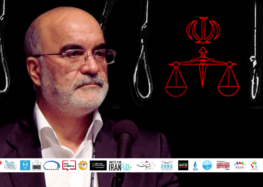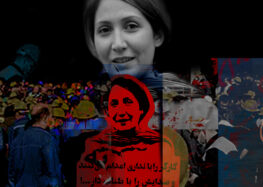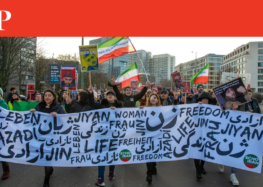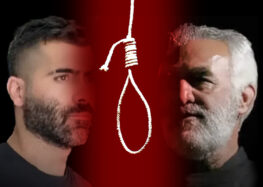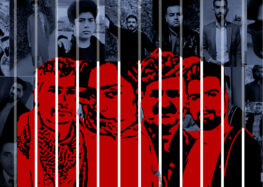Draft Citizenship Charter Will Allow Continued Rights Violations say Human Rights Groups
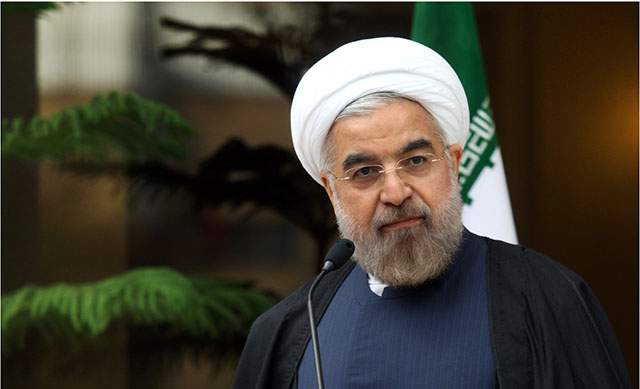 In a letter addressed to Hassan Rouhani, Iran’s President, Human Rights Watch and the International Campaign for Human Rights in Iran expressed appreciation for the draft Citizenship Rights Charter, but expressed deep concern over the consultation and preparation phases of the draft, its contents, and its enforcement. The letter details the ambiguities present in the draft Charter as well as other issues of concern in the document, which leave open dangerous loopholes for the continuation of widespread rights violations in Iran. The letter was sent to the Iranian President’s Office by the two organizations on December 23.
In a letter addressed to Hassan Rouhani, Iran’s President, Human Rights Watch and the International Campaign for Human Rights in Iran expressed appreciation for the draft Citizenship Rights Charter, but expressed deep concern over the consultation and preparation phases of the draft, its contents, and its enforcement. The letter details the ambiguities present in the draft Charter as well as other issues of concern in the document, which leave open dangerous loopholes for the continuation of widespread rights violations in Iran. The letter was sent to the Iranian President’s Office by the two organizations on December 23.
There are serious ambiguities in the document regarding the right to life, the exercise of fundamental rights, the right to freedom of speech, information, and the press, the right to freedom of assembly and association, religious minority rights, women’s rights, protections for non-nationals, and inhumane punishments (such as stoning, limb amputations, lashing, and hanging by strangulation). The International Campaign for Human Rights in Iran and Human Rights Watch have asked Iran’s president and his administration to fully address the existing ambiguities and all other issues of concern when drafting the final document, in order to improve the situation of human rights in Iran. Below is the letter.
Joint Letter to President Hassan Rouhani re: draft Citizen’s Rights Charter
December 23, 2013
His Excellency Dr. Hassan Rouhani
President
Islamic Republic of Iran
Your Excellency:
On November 26, 2013, in line with promises you made both during your presidential campaign and thereafter to address the serious human rights concerns of the Iranian people, your government published a draft Citizens’ Rights Charter. According to the press release accompanying the draft charter your government has provided one month for the public at large to provide comments and feedback on the charter. Human Rights Watch and the International Campaign for Human Rights in Iran (“the Campaign”) are writing to express our views and concerns regarding this draft document within the time allotted for providing feedback.
We applaud your government’s efforts at identifying human rights as a priority issue during your first 100 days in office and initiating public discussion on reforms that need to take place. Yet we also have serious concerns regarding the process of consultation and drafting, the charter’s content, and its implementation.
As a preliminary matter, it is not readily apparent why Iran needs to go through the exercise of preparing such a charter since it is party to major international human rights treaties – including the International Covenant on Civil and Political Rights, the International Covenant on Economic and Social Rights, and the Convention on the Rights of the Child. These treaties obligate Iran to incorporate international standards and norms into its domestic law. Article 1.3 of the draft charter fails to identify these standards as a source of authority for the draft charter.
In addition to ignoring its international treaty obligations, Iranian governments have willfully disregarded their own laws, including constitutional provisions that safeguard fundamental rights. For the past decades Human Rights Watch, the Campaign, and other international and domestic rights groups have documented many of these rights violations.
Previous Iranian governments over the years have undertaken efforts similar to the current draft charter—efforts that raised much hope but failed to produce meaningful rights reform. The 2004 Citizens’ Rights Law issued by then-Head of the Judiciary, Ayatollah Hashemi Shahroudi, and passed by the Sixth Parliament (2000-04), is but one example of such an effort. The law specifically enumerated the rights of individuals detained for allegedly violating Iran’s criminal laws. In many instances the 2004 law simply reproduced provisions already codified in Iran’s constitution and code of criminal procedure while in others it described, in detail, specific conduct prohibited during arrest and pretrial detention.
Unfortunately the passage of the 2004 law did little to protect or advance the due process rights of the individuals who have since been arrested, detained, interrogated, prosecuted, and even sentenced to death by Iran’s ordinary and revolutionary courts. It is clear that serious and meaningful rights reform in Iran cannot take place until Iran’s domestic laws reflect the full range of rights guaranteed under Iran’s international legal obligations, and until the government is ready and willing to act on these obligations. This willingness needs to include evidence that agencies and powers beyond the immediate control of the executive branch, such as Iran’s intelligence and security forces and its judiciary—which regularly violate human rights with impunity—also abide by Iran’s international legal obligations.
Section 3 of Iran’s Constitution, which addresses the “Rights of the People,” includes many provisions and guarantees that Iran’s security and intelligence forces, and its Judiciary regularly violate. Any plan to address rights violations in Iran should include an effort to respect existing rights protections codified in existing laws, including its constitution. We note that with respect to several rights and protections Iran’s Constitution has more favorable language than the draft charter.
At the same time it is important to note that there are serious flaws in Iranian domestic laws, including in the Constitution, Civil Code, and Islamic Penal Code. On August 1, 2013, a few days prior to your inauguration as the seventh president of the Islamic Republic of Iran, Human Rights Watch issued a public letter in which we identified nine priority areas for reform in the area of human rights. Human Rights Watch issued the letter in response to an election campaign in which you made many promises to the Iranian people—promises that played a role in your victory. The Campaign issued similar calls to your government to act on campaign promises to improve the country’s dire human rights situation.
Within this context we urge Your Excellency to consider addressing the following concerns with regard to the draft your government submitted for comment and review on November 26:
Ambiguities Regarding the Legal Significance of the Charter: Article 1.1 of the draft charter states that its provisions “in no way effect the other rights of Iranian nationals and other nationals codified in other laws, regulations, or international conventions.” Article 1.6 provides that the charter reflects the “‘programs and policies’ of the government,” that its purpose is not to “create, expand or restrict existing rights and responsibilities,” but that it simply sets forth “a collection of the most important citizenship rights.” Moreover, Article 1.2 makes it clear that the charter should be in harmony with existing laws and regulations and must “not limit any of the other identified or recognized citizens’ rights.”
This disclaimer language casts doubt on the legal significance of the draft charter despite the fact that section 3 provides measures to ensure implementation of the charter’s provisions. It is not clear how any inconsistencies between the draft charter and existing laws, including Iran’s Constitution, will be resolved. (Article 1.6 interestingly acknowledges that the charter may include rights that do not currently exist in the law and says that the government will undertake “serious and expansive efforts” to push through necessary legal reform to protect these unspecified rights, but in light of the aforementioned disclaimers this article appears to be solely aspirational to improving upon rights protected in existing laws.)
Right to Life: For the past several years, Iran has carried out the second largest number of executions in the world, behind China. In 2012, Iran hanged more than 500 prisoners either in prisons or in public. Since your electoral victory on June 15, unofficial and official sources have reported at least 390 executions. The vast majority of executions in Iran are for drug-related offenses or other offenses that under international standards do warrant the death penalty. In other cases where courts have issued death sentences for serious offenses, such as for murder, Human Rights Watch and the Campaign have documented serious due process violations that taint the validity of the underlying convictions. Moreover, Iranian law still allows the execution of child offenders, defined under international law as persons under age 18 at the time of the alleged offense.
Article 3.1 of the draft charter provides that “citizens enjoy the right to life” but allows the government to take that right away “on the basis of a ruling issued by a legitimate court convened pursuant to legal standards…” The article also prohibits the state from violating an individual’s right to life if his or her prosecution violates due process standards, including the right to a fair trial. In light of the pattern of executions for crimes that do not warrant the death penalty and death sentences handed down following seriously flawed trials, we urge your government to push for legal reforms that specifically prohibit courts from imposing the death penalty in contravention of Iran’s international legal obligations. We also urge Your Excellency to push for a complete moratorium on the use of the death penalty in Iran, and take the lead in initiating public dialogue regarding the right to life.
Exercise of Fundamental Rights: Scores of individuals are currently detained in Iran’s prisons merely for exercising their basic rights, including freedom of expression and association and peaceful assembly. The state has prosecuted and courts have convicted many of these political prisoners under Iran’s vague and overly broad “national security” crimes. Human Rights Watch and the Campaign have previously asked you to push for the immediate and unconditional release of these political prisoners, including political and civic activists, journalists, lawyers, and rights defenders.
It is particularly troubling that the provisions in the draft charter contain language that, largely consistent with Iran’s existing laws, limits or restricts the exercise of fundamental human rights. There are several instances of vague and open-ended conditions or disclaimers in the draft charter which restrict rights “within the framework of the law,” with “due consideration to Islam,” or as outlined in the Constitution.
Specific examples of significant restrictions on fundamental rights in the draft charter include:
Right to Freedom of Speech/Press/Information: As of December 2013 there were at least 35 journalists and bloggers behind bars in Iran for having violating Iran’s vague and overly broad national security laws. Security and intelligence agencies heavily censor the press and print media, enforcing an array of censorship rules that Iranians cannot cross without risking arrest and long prison terms. These restrictions extend to television and the Internet, and authorities routinely block or filter websites, jam satellite signals, and slow Internet speeds, depriving Iranians of freedom of the press and access to information.
Articles 3.11, 3.15 and 3.16 of the charter ostensibly assert protections for freedom of thought/speech, access to information, and the press respectively. All of these freedoms, however, are circumscribed by conditional language such as “within the framework of the law” and “as long as it does not destroy the foundations of Islam.” As previously stated these vague and overbroad restrictions threaten to render the protections meaningless, and allow authorities to arbitrarily deprive individuals of their fundamental rights.
Right to Freedom of Assembly: Article 27 of Iran’s Constitution states that public gatherings and demonstrations may be “freely held” as long as demonstrators do not carry arms and the demonstrations are not “detrimental to the principles of Islam.” Despite this authorities arbitrarily arrested thousands of peaceful demonstrators after protests following the disputed 2009 presidential election. Authorities eventually released many, but prosecuted some in unfair trials. There is no mention of the right to peaceful assembly in the draft charter.
Right to Freedom of Association: During the past eight years authorities have shut down dozens of opposition political parties, non-governmental organizations, independent trade and labor unions, and student groups. The Iranian Bar Association, Shirin Ebadi’s Center for Human Rights Defenders, and the Journalists Association are examples of groups that authorities have either shut down, declared unlawful, or severely restricted. Many members of these groups are currently serving heavy prison sentences or banned from continuing their activities as part of these organizations.
Article 3.52 of the draft charter generally provides the right to freedom of association in “parties, societies, political or trade associations, and non-governmental organizations.” The article specifically says that “membership or the lack of membership [in these groups] should not lead to the restriction or deprivation of citizens’ rights,” but adds that the aforementioned groups must be “legal.” Again, this restriction threatens to render the protections meaningless by arbitrarily depriving legal status to groups the government considers unsavory and allowing authorities to deprive individuals of their right to freedom of association.
Religious Minority Rights: Pursuant to Articles 12 and 13 of Iran’s Constitution, only Twelver Shi’ism, Sunni Islam, Zoroastrianism, Judaism, and Christianity are recognized religions protected by law. Adherents of these religions are “free to perform their religious rites and ceremonies, and to act according to their own canon in matters of personal affairs and religious education” within the law’s limits. This excludes Iran’s largest non-Muslim minority, the Baha’is, from legal protections. Members of religious minorities are subjected to legal or de facto discrimination in their employment and their ability to exercise their rights to political participation, and social and cultural rights. This discrimination is particularly acute vis-à-vis members of Iran’s evangelical/Protestant Christian communities and Sufi groups such as the Nematollahi Gonabadi order, who the authorities systematically target and deprive of the right to practice their faith. Iran’s significant Sunni population, too, faces unnecessary restrictions including prohibitions on their right to freely worship.
Despite these fundamental flaws in Iran’s existing legal structure, Article 1 of the draft charter, which states that all “Iranian nationals regardless of gender, ethnicity, social class, race or other similar categories” may enjoy “citizens’ rights and guarantees” identified the country’s laws and regulations, glaringly omits “faith” or “religion” as one of the protected categories. Article 3.117 of the charter limits “conducting and participating in religious ceremonies” to faiths “officially recognized in Iran’s Constitution.” Several other provisions in the draft charter seemingly refer to respect for diversity of religions and freedom from discrimination, but it is not clear whether the term used—mazhab—refers to different religions or various sects within Islam.
Women’s Rights: Iranian women face discrimination in personal status matters related to marriage, divorce, inheritance, and child custody. A woman needs her male guardian’s approval for marriage regardless of her age, and cannot pass on her nationality to her foreign-born spouse or their children. A woman may not obtain a passport or travel outside the country without the written permission of a male guardian. Iranian women are also much more liable than men to get caught in crackdowns relating to strict dress codes.
Article 3.99 requires the government to respect women’s rights in all circumstances and “in light of legal standards.” Article 3.107 says that women should have every opportunity to benefit from free choice of “suitable attire” according to “Islamic and Iranian standards,” and that the government is responsible for providing the conditions for the promotion of such suitable attire.
Ambiguity Regarding Protections for Non-Nationals: The draft charter repeatedly refers to the rights of “citizens,” and Article 1 clearly states that “Iran’s nationals” may enjoy “citizens’ rights and guarantees” without mentioning resident non-nationals, including at least three million documented and undocumented Afghan and Iraqi refugees and migrants who currently live and work in Iran. Does this mean that articles 1.3, 3.11, 21.3, and 3.92 do not protect non-nationals’ right to right to life, speech, ethnic identity, and freedom from torture, respectively?
Iran’s international legal obligations require the government to ensure that non-nationals enjoy the same guarantees and protections of fundamental rights as nationals or citizens of Iran. Many non-nationals currently living in Iran continue to experience rights abuses perpetrated by governmental authorities.
Inhuman Punishments: The amended penal code which came into force earlier this year retains many punishments that clearly violate Iran’s international legal obligations regarding prohibitions on cruel, inhuman or degrading treatment or punishments such as stoning, hanging by strangulation, amputation, and lashing. The draft charter makes no effort to prohibit these inhuman practices.
***
In light of the foregoing concerns our organizations believe that the most valuable contribution of this draft charter is its potential to initiate a much-needed national dialogue on rights reforms in Iran. We therefore urge your government to extend the one-month period for review and commentary to at least six months, and ensure that the process of consultation and comment is inclusive, transparent and fair. This could be done, for example, by:
- Making it clear that Iranians inside and outside the country can freely organize, gather and discuss the provisions of the charter and amendments they deem necessary,
- Publishing guidelines describing the process by which input and feedback from Iranians and non-government organizations will be considered, reviewed and integrated into any legislation seeking to improve the rights situation in the country
- Actively engaging with Iranian civil society through meetings, workshops and negotiations to ensure an opportunity for all voices to be heard.
Taking these preparatory but significant steps can go a long way in demonstrating that your government is dedicated to real and meaningful rights reform in Iran.
It is also our hope that your government will seriously consider the assessment we provide in this letter, along with the views and concerns expressed by Iranians and international organizations working to improve the rights situation in Iran, and reflect our views in any final document seeking to address, remedy or rectify the serious rights situation in the country.
We thank you for your attention to these important matters, and look forward to hearing from your office in the near future.
Sincerely,

